Content warning: This article includes mentions of suicide and domestic abuse. Proceed with discretion.
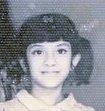

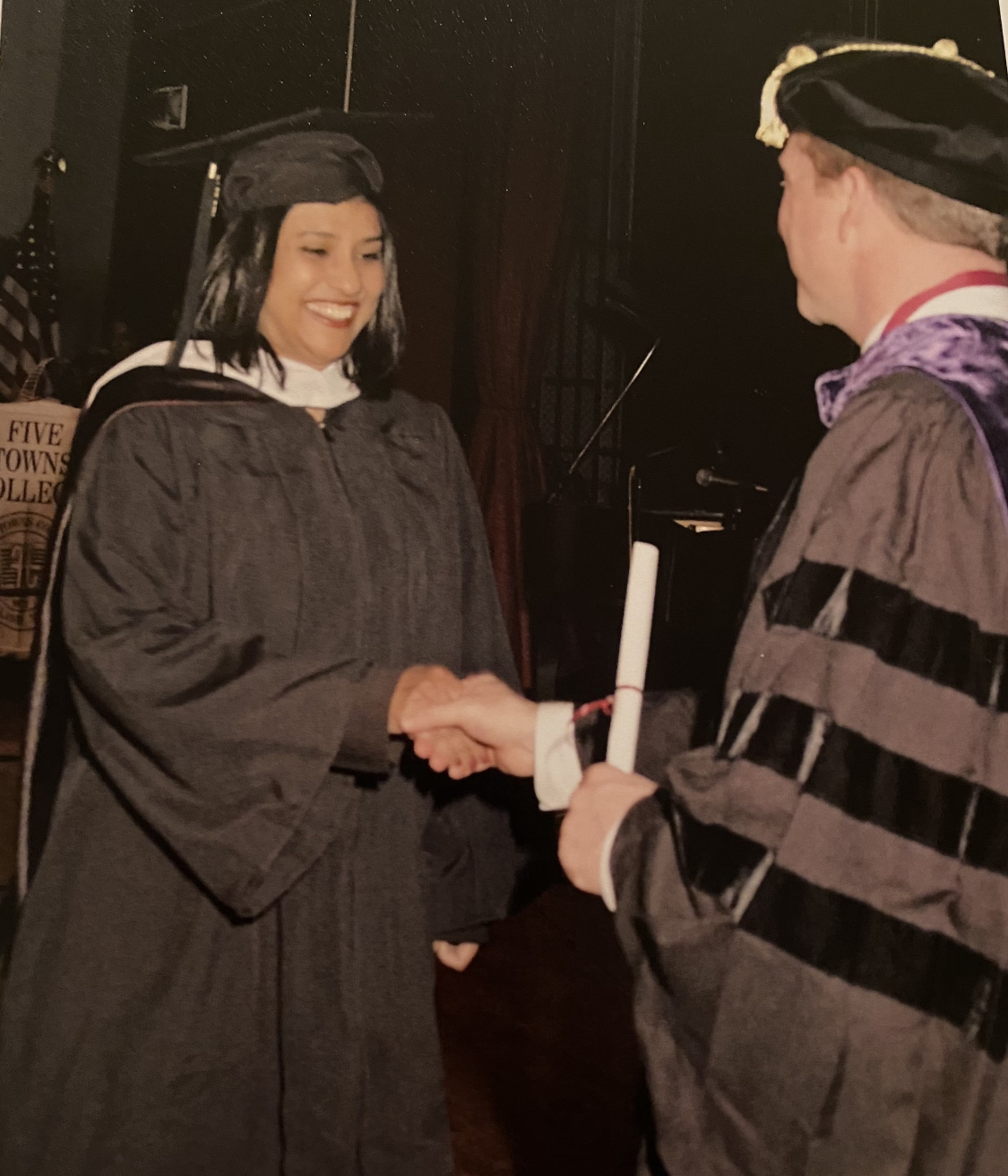
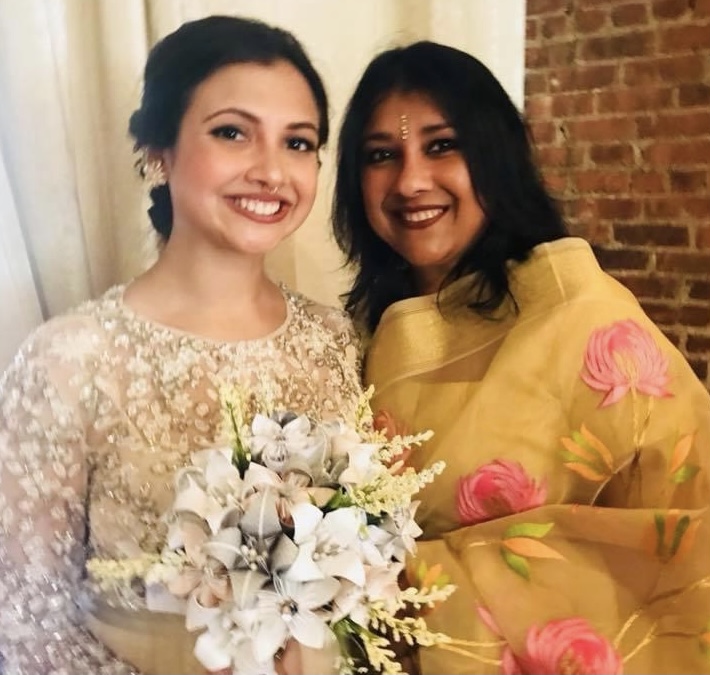
My mother dropped off a bag of photo albums that I used to spend hours looking through as a child. I left the albums in the bag for a few days in the corner of my living room, working up some emotional courage to go through them. I haven’t looked at these photos in at least 20 years. They’ve been tucked away in my childhood home and then carted around with every one of my mother’s moves. They are dingy and dilapidated. When I finally took them out of the bag, the books capturing my mother’s moments fell apart in my hands.
I think some of my more prominent memories were fantasies about who my mother was before she was my mother. I looked at these faded, yellowed photos, and imagined what she was like in each stage of her life. Was she good at school? Did she have friends? Did she fight with her brother and sisters? Did she get along with Nanu? What were her hobbies? What was she thinking when she married my baba? Was she always so enraged and sad, or was she only this embittered after she birthed me? Did she have another dream for herself? For a long time I was filled with a lot of complicated emotions for her, of course I always loved her, but I was also resentful, and many times felt as if I hated her. I mirrored her rage and sadness, and found ways to antagonize and punish her because I couldn’t forgive her for bringing me into this world with the intent to carry out her same life. I didn’t know it then, but I understand now, that it must have been so incredibly hard for her to be my mother.
My nana and dada were introduced through a mutual friend, and my mother was matched to my dada’s second eldest son and married very quickly. I used to stare at this picture of my mom during her gaye holud and recreate this photo of her with my art skills as a five-year-old. She was ethereal with her crown of flowers, her neck and wrists equally adorned. Her eyes were to the ground in each photo. I remember when I was attending one of my khala’s weddings, maybe almost two decades ago, she too had her eyes to the floor, as her hands were being decorated with henna in preparation for her own gaye holud. While the Nanus and other khalamonis were blistering with excitement for the nuptials, my khalamoni did not smile once. I asked her why she was getting married to someone she didn’t know if it made her so sad? Her reply was that she had to look sad to show her parents how much she will miss them, that it was a sign of respect to them, because they took care of her so well she doesn’t want to leave them. She wanted to get married, and for my other khalamonis they have been married for decades to my khalus, overall content with their lives, and some very happy and in love all these years later. That wasn’t the case for my mother. Maa told me she was very anxious on her wedding day, distraught over the loss of her freedom and what her life would be like moving forward.


My parents didn’t speak to each other until after they were married. Just as quickly, my mother was whisked away from her home, family, and friends by my father, an utter stranger, to a strange city, to be enrolled in Newtown High School in Queens, New York as a pregnant high school student. Weighing no more than 88 pounds when she conceived me, and not gaining much during her pregnancy, the school refused to give my mother an elevator pass, an unspoken punishment for being a knocked-up teen. As my mother grew more pregnant with me, she was slower on those flights of stairs to her classes. Once a classmate had pushed past her, knocking her off balance and shoving her down those stairs. She sat on those steps to regain her strength, determined to go to class, but when she got home, my father decided that was her last day in school. It didn’t matter how much she excelled in her classes or that she loved learning so much.
Maa told me during the beginning of their marriage, my baba was very sweet and loving. They started to have problems when my dadu would interject on the decisions that they would make together, and because my father loved and respected my dadu, he would reluctantly disregard my mother’s input until he didn’t ask for her opinion at all anymore. Maa told me that she was taught to have grateful compliance. The rule was that if she had a home, and a husband that provided, she didn’t have anything to really complain about. So, my mother didn’t openly fret about not being consulted anymore, and since she was not going to school, she was on her feet, cleaning and cooking for my grandparents and father, his siblings when they visited, and their guests, right until she had contractions.
For a long time I believed her grief and privation nourished me.
She almost died giving birth to me. She waited 26 hours with no medication until the doctor reached in with forceps and pulled me out, as if I didn’t want to be born into this world as a girl. I was the embodiment of her unfulfilled hopes and quiet anger. I refused to drink from her breast and was fed on formula, finding ways to revolt against her in infancy. For a long time I believed her grief and privation nourished me. With every bite of food, she also swallowed her suffering, internalizing her despair which I harbored until the day she went into labor with me. After living with my dada and dadu until I was a few months old, we moved to our new home in Long Island. My baba was away working long hours for the MTA and my mother was further isolated. She was alone in a house, with a baby that she didn’t get help to raise, washing an endless stream of cloth diapers, cooking, cleaning, tending to the outside yards, watching Bollywood movies on VHS, and sleeping to pass the time until Baba came home to sleep and head back out again.
When I was 11 months old, and my mother was pregnant with my brother, my parents’ relationship degraded quickly. The paranoia of a beautiful young wife left at home for most of the day was exasperating my baba’s insecurities, and he would say terrible things to her. My mother’s routine was now compounded with cruelty and the stress of two young children. The fissures in her veneer began to appear, and overtime, the cracks deepened.
My mother swore that I purposefully antagonized her and complained out loud that she was being punished by Allah for birthing a child that didn’t listen and was destructive. I had run away from her in a children’s store to be found later playing with toys in a display crib and would try to escape her grasp so often she had to leash me when we went out. I constantly created messes— took small pots and scooped toilet water out onto the floor, redrew over areas she spent time on her knees scrubbing, and threw baby powder everywhere in the living room. I would hold a door frame to steady myself and kick my feet at her, yelling “Lathi!” repeatedly. I got smacked here and there when I behaved “badly” at outings or embarrassed her in public. When I was about four years old, Maa’s sari caught on fire. To this day, I don’t know if she purposefully ignited her sari, but she stood there and passively let the fire creep up her anchal. She only came to her senses and put out the fire when my brother started screaming.
My mother was tired. What little patience she had left was expended after I started school. The aunties began pitting cousins against each other and measured their value with their child’s academic success. I started going to kindergarten and Maa now also had to reinforce lessons from school at home. She already felt disillusioned with just being a stay at home wife and mother, but then the cutting remarks from the other women in her small circle crippled her because she would be marked as a failure because I was a failure. I wasn’t learning fast, or well enough. I didn’t know English when I started school, or that my “good name” is Humaira. I was scared of being in this unfamiliar setting with all of these unfamiliar people I could not communicate with. At home, whatever methods my mom tried to get me to learn didn’t help either. If it seemed like I wasn’t paying attention, that she had repeated the directions too many times, had demonstrated what she wanted me to produce too many times, or that when she asked me a clarifying question and I didn’t know the answer, her level of frustration would land on me with hits that knocked me off my feet and the wind out of me, mapping me with bruises that was covered by my school clothes. I would fake being sick to avoid school so that I didn’t have to come back with more schoolwork that led me to these study sessions with Maa. However, I wasn’t a great actress or smart enough to fabricate symptoms flawlessly, and I was sent to school.
When I started elementary school, Maa dressed in a simple sari or salwar kamees, pushed a stroller with my little sister in it, with my brother in tow and walked me to and from school every day. Teachers would yell at me because I couldn’t follow directions, and they spoke louder at me as if that would magically make me understand what they were saying. My English language acquisition was slow as my ESL classes didn’t support native Bengali speakers, and my report card reflected how little I understood of the subject and lessons. I grew more nervous and fearful about coming home from school as the class lessons advanced.
Maa looked progressively gaunt, her lips were always pulled tight under her teeth, in a strict grimace, her eyes frenzied, surveying for anything that may be out of place or wrong; her fingers were always curled into her palms, her nails etching little cuts into her flesh. I tried to pick up on any sign that would let me know a blow may still come my way at any time, and just like she walked on eggshells with my father, I tip-toed around her eruptions. I internalized her treatment of me. I tried to give her everything she wanted from me. After every beating I would cry and lament over how I brought this upon myself. What did I do wrong? What could I have done better? Maybe if I got a higher score on that test? Maybe if I was student of the month every month? Maybe if I sat up straighter? My mother had some sort of release from her frustrations, irritations, grievances, and perceived failures with each hit.
Once I accepted that I would never figure out the equation that would have kept me safe, I stopped negotiating with fate and looked for ways to purposefully oppose her.
I was tired of my life like she was tired of hers. Taking care of all the household chores, cooking, cleaning, mowing the huge back and front yards, growing vegetables for us, doing the grocery shopping, taking care of three kids, performing for my father on demand, bringing him his tea, snacks, and fulfilling whatever else he had requested were futile attempts in face of the fragility of his insecurities. She couldn’t convince my father that she was a good wife, and I couldn’t convince my mother that I was a good daughter. Once I accepted that I would never figure out the equation that would have kept me safe, I stopped negotiating with fate and looked for ways to purposefully oppose her. I couldn’t have been older than seven. I didn’t throw tantrums; I didn’t openly protest when she lashed out and struck me with open or closed palms— I didn’t want her to have any satisfaction from striking me, or indicate that she had any impact on me. I told myself to become stone and was able to hold my tears through sheer will power, and kept my cries entrenched in the vice of my throat by gritting my teeth so hard they could have cracked. My mother would stop her onslaught out of pure exhaustion and when she would walk away because she did not get a reaction out of me, only then would I cry out in pain, by myself. This was my victory over her. I protected myself by turning myself inward and detaching from my skin and limbs, my body became my armor. After a while I didn’t have to grit my teeth to bear the pain, or have the need to cry after, I stopped feeling, and would then go about my business as usual, like nothing ever happened.
I don’t remember how old I was, but my younger sister was not adept at walking yet, so maybe I was still seven . . . Maa was preparing lunch for us and had placed a plate on the counter between the sink and stove. She left the kitchen to do something else for a minute. I was supposed to be watching my baby sister very closely, but she had reached up and grabbed a plate which fell and shattered on the floor. I rushed over and picked her up, a piece of glass stuck in her foot, and she was bleeding. Maa charged back in, took her from me, cradled her with one arm, and smacked me hard in the face with her other hand, and then left to tend to my baby sister’s wound. My feet were bleeding too. I did not cry. Between my parents fighting, being responsible for and keeping my siblings occupied until the yelling stopped, being at Maa’s mercy because of poor grades or anything else she disapproved of, I stood there with the ruminating pain in my jaw and looked up at the dark blue handled knife set that was set on top of our microwave, and thought that if I could reach high enough I could get the butcher knife and end this life of mine.
In 1992 Maa learned how to drive, which increased her responsibilities with running errands for the house instead of my baba. She wasn’t free to actually go anywhere else on her own without my father if she wanted to. In 1994, Maa attended classes at the public library to study for the G.E.D., after she earned her G.E.D., Maa started claiming small allowances which baba agreed to because he didn’t want her home alone while my siblings and I were at school, or maybe to keep her from lighting herself on fire again. Once my younger sister started school, my mother became a substitute teacher’s aide for my school district. By the end of third grade she softened towards me. I worked exceptionally hard to learn English and I did well in school after I tested out of ESL at the end of second grade. I was an honor student every quarter, I was going to the masjid and learning how to read the Quran and recite surahs, I was a part of many school extra-curricular functions, and also won many school-based awards— data and stats that she traded with the other mothers to prove that she was exceptional in raising me. I wanted Maa to be proud of me, for her violence towards me to stop, and the physical beatings overall did stop because now I was an outstanding student and didn’t bring her any embarrassment . . . but sometimes even if I didn’t do anything particularly heinous in her eyes, she still set off in bouts of rage, and yelled until her voice turned hoarse.
After being a substitute teacher’s aide, she went to Suffolk Community College and enrolled in courses to be eligible to work full-time. Baba paid for the courses, and she excitedly went to school, but he made sure to put her in oversized and hideous clothing to ward off people’s gazes. She passed those courses and in 1997, she was hired by North Elementary as a full-time teacher’s-aide. She made about $600.00 a month which my father took and put away.
My khalamonis and mamas would tell me stories of Maa as a girl that I couldn’t imagine her ever being, seemingly fabricated stories of this troublemaker and prankster in Bangladesh. Maa was a beautiful artist and loved to read. She would bother her peers at school, but her teachers let her be a little mischievous because of her good grades. She would throw rice on bald men’s heads from her veranda with her cousins. She would steal flowers from people’s gardens. Maa used to put my uncle’s clothes on and had cut her hair short so she could play cops and robbers on the rooftop of her building, like a boy. But Maa used to mostly aggravate my nanu, I guess much like how I used to aggravate her. Maa would take wet, freshly laundered clothes, bunch them in a bag and hide them under the beds so they would get stinky for Nanu to find. Maa used to somehow get high enough to place clothes on the ceiling fan so when Nanu turned on the fan, those clothes fell on her head. And Nanu did hit her, quite a lot. One day, Maa got so sick of the beatings, she emptied her armoire of clothes and packed a bag to run away. When Nanu went to look for outfits for a dawat and saw that all the clothes were missing, she beat Maa for having the gall to even think about escaping. Those stories seemed so unbelievable. I thought my khalamonis and mamas were lying to me or heeding some type of warning that eventually all rambunctious girls came to heel. I had rare moments of seeing Maa laughing in these old photos from her youth, but I don’t remember ever seeing her genuinely smile or laugh when I was growing up. Where did that young girl in the photos go? I would have really liked her, and that girl would have been my friend. But Nanu beat out all of her unfavorable and unbecoming traits by the time Maa was of marrying age.
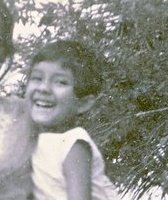
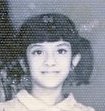



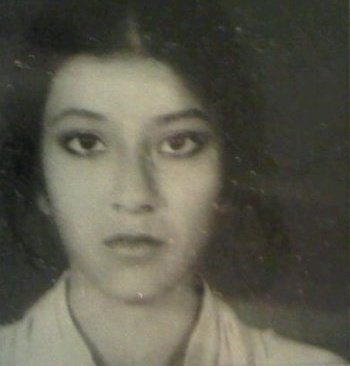
I don’t think it was Maa’s intention to leave my father. Having one foot in the home kept her bound to the expectations of her Bangladeshi culture, but her other foot was treading new territory. What she didn’t receive at home, she received at work. She excelled at her job, and made new friends who loved her charm, charisma, and company. Maa built a support system outside of the family and culture with people from different upbringing and backgrounds, and maybe she didn’t realize it then, but they were showing her a way out. I sensed a change in her, and my baba did too. She looked forward to work, she was being invited out by these new friends, she would wear a sari to their backyard barbecues, and everyone would shower her with compliments. My baba gambled to cope with how poorly he felt. We went to Atlantic City as a family a few times, but when he went to Atlantic City alone, which became more and more frequent, he sometimes made money, or usually broke even, but at his worst, when he really couldn’t sit with his feelings, he lost thousands of dollars at a time at the roulette table.
We were a family that was so enmeshed in our destruction and devastation that we were completely debilitated in saving each other, even when faced with death.
In 1999, Baba found emails between Maa and another Bangladeshi man who would inscribe that he loved her at the end of the emails. She swore to my Baba that it was a platonic love, that they were friends, this man had a girlfriend, that she told all of her friends that she loves them too. My father did not believe her, and this betrayal was met with heightened derision, so much so that one night their fight was exceptionally explosive. Maa was yelling at Baba to forgive her, that she felt tortured living like this, and he was spewing such disgusting vitriol that she went into the bathroom, stormed back in front of my father, and gulped down some Pine Sol. I don’t know why I didn’t call the ambulance. Fear immobilized me. I was scared that my younger brother, little sister, and I would be broken up and sent to different foster homes. What would happen to us and the house if we called for help or if Baba went to jail? Baba knocked the cleaner out of her hands, spattering it all over the carpet and walls, but he didn’t call the ambulance either. We were a family that was so enmeshed in our destruction and devastation that we were completely debilitated in saving each other, even when faced with death. We weren’t ready to change. I held Maa up over our bathroom sink and forced her to throw up. I stayed up the rest of the night monitoring her. Maa’s skin was clammy, she shook uncontrollably, her teeth chattered against each other. I wrapped her in a blanket, listened to her breathing and held her. Sometimes her breaths were deep and heavy and sometimes her breathing was sharp and shallow. I prayed to the universe to not let her die, for her to come out of this okay, and somehow, she did.
By the time I was in ninth grade, the good grades afforded me nothing. The severe beatings stopped years ago, partly because she had some relief through the friends she had, the value she felt from being good at her work, but mostly because her anger turned outwards towards my dad. I had my behavioral problems at school here and there, sometimes I didn’t do so well on my tests, and overall, my grades were flailing. Entering high school, I continued to be fortified against Maa, I was angry that she hadn’t gotten us out of this mess yet. I never knew which moment of disappointment would agitate her. The arguments would be mostly her pleading with me to do better, that school would help me, that I needed school to have a future, and I refused her requests. I felt suffocated with constant anxiety. I couldn’t understand how two people that were so incredibly incompatible could stay married after all of these years. I, in turn, begged Maa to not keep us in this situation, if she wanted me to do well in school for a future, she should fight for a better future too. She believed that she couldn’t just leave. If she left, where would she go with three kids? How would she afford housing and food for us? She couldn’t pay any bills on her own, she needed my father to pay for our livelihood. It took some time, but eventually I understood that school was what she saw as her independence. She was so hard on me when it came to school because she needed me to have options and opportunities that she didn’t have, so that I didn’t end up like her. So, she stayed, and I excelled in school again and looked for my way out.
In 2001, Maa was recommended for a special program for teacher aides to earn a BA in education. Maa never received her acceptance letter. She incessantly followed up, and one day she found her letter ripped up and buried in the garbage can outside. Maa confronted Baba about this with her soiled shredded letter in her hands. Baba was quiet. Maa never anticipated that he would do something so cruel, and Baba couldn’t anticipate his wife needing a job, or more of an education, if he worked so many hours and so hard to provide. Our lives continued to be potent with conflict, and my parents were contentious and brought out the worst in each other. She went to the bank to take out money to enroll in the classes, but she couldn’t, her debit card was not working. The teller informed Maa that her husband removed her name from the account. That day something truly broke in Maa. She went to her job and stopped the checks from coming to the house and had the payroll secretary hold it until she picked it up. She went to a different bank and opened her own account where my father didn’t have access. This life my mother was building outside of the house at first chipped at my baba, but now Maa was breaking away from him.
Maa was working, going to school, and found ways to be out of the house, and Baba spent time in Atlantic City or stayed at my dadu’s, but when he was home, the thick tension in the air had me trembling and in a state of sustained nausea. My siblings and I were left alone at home for most of the time, and in those moments I felt a sense of calm. There were no threats, this was the safest we would be. One of my mom’s friends had asked her, “Why don’t you just leave?” Maa told her that she relied on baba, that she didn’t have anything to support us with. This confused Maa’s friend.
“But this is America. You’re going to get everything,” she said.
She filed for divorce in January 2003. She worked a second job at a grocery store, went to college in between her two jobs. Baba stopped paying the mortgage and bills to punish Maa and her debt ballooned to $30,000 to keep us afloat through the divorce process. I worked as much as I could and helped with bills and bought food for us to eat every day. I left the house as soon as I could after graduation. I felt guilty for leaving Maa and my siblings, but my threshold in enduring was at its end. Maa signed a parent loan for me to go away for college and not stay behind. She insisted I use school to make something of myself, that she will be okay in the process, and to not be scared for her. I would come back on the weekends and my school breaks, not completely abandoning her.
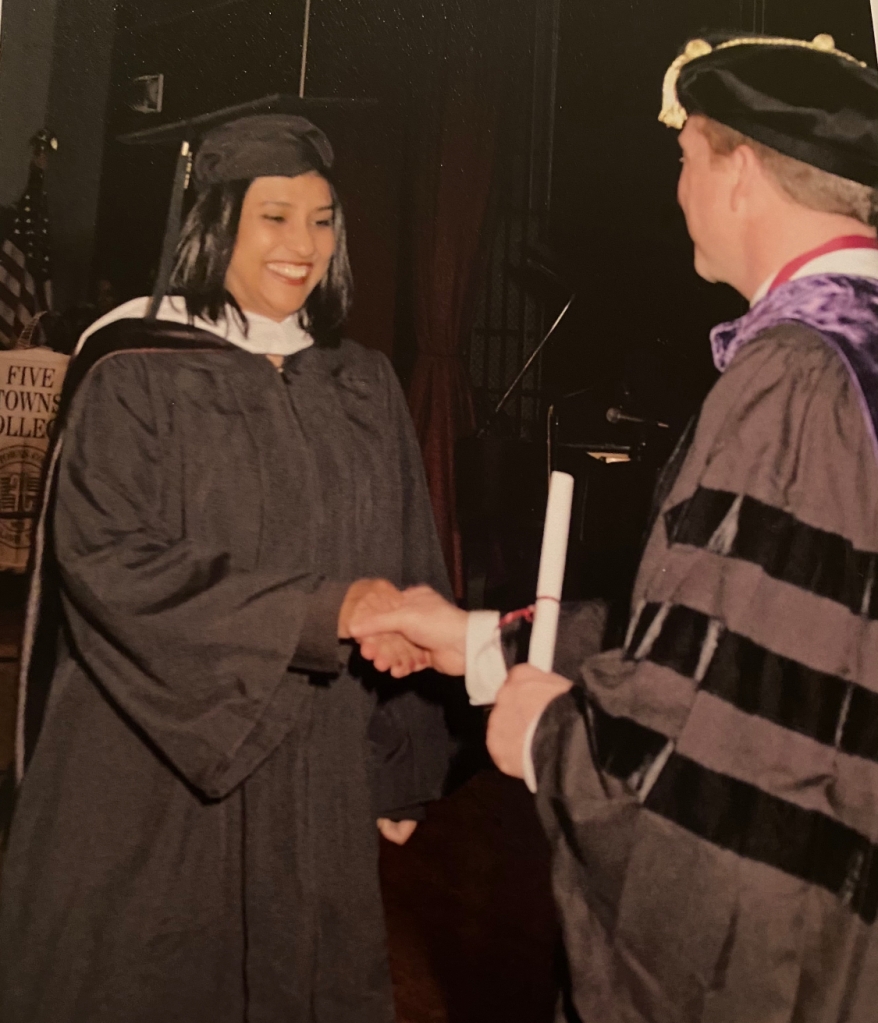
Since Maa filed for divorce, Baba thought maybe she would drop it, and that they would stay married, but she refused. They had to co-exist in the same house while the divorce was taking place. The bulk of their relationship was never amicable, and to think somehow there would be civil peace between them through the divorce was incomprehensible. Baba didn’t know how to be the man Maa needed in a partner or how to apologize to her. He tried to rein her in with more biting insults, and his behavior towards her had become more aggressive and untoward, but when that strategy lost its function, his volatility heightened. One night in 2004, Baba accused Maa of paying for her lawyer fees through sex and hurled insults and his stream of contempt for her. My brother was begging for Baba to cool his onslaught. When his pleas went ignored, and Baba continued with his ridicule, my brother lost his self-control and punched a mirror for Baba’s hostilities to stop, slicing his knuckles in the process. Maa took my brother to the emergency room at 2:30 in the morning and he came back with stitches. Soon after that incident Maa was granted a restraining order and Baba was removed from the house by the police. I didn’t know how to feel. There was no reprieve. Regardless of how completely hostile our lives were within those walls; my heart broke for my father and yet I was relieved for my mother to be free of the life that caused her to attempt taking her life on several occasions. By January 2005, Maa and Baba were officially divorced. She got the house and continued child support. That May, she graduated with her bachelor’s degree in Primary Education, and by August, married her online friend from back in 1999. They are still together.
My feelings around those years and my parents are complex and layered. My parents were volatile, their levels of cruelty towards each other and us is something that I am still wrestling with. I left home for college at 17, and my parents divorced when I was 19— all these years later I am trying to make sense of that life and make the most of my adulthood. The paradox of my emotions had me in suspended instability for many years. I was spiteful. I was so furious with my mother because my days were filled with her; she was my caretaker, my nurturer, and since my baba was mostly out of the house, I saw him as this separate maelstrom that came in and out of my days. It wasn’t fair that I discriminated against my mother this way, but she caused me direct damage when I looked for her to give me more. Who could I have been if I was instead raised with the love and affection that I needed then? What could I have accomplished with my life if I were wrapped with safety and support? The impact of those formative years didn’t make me love my parents less, though. I wanted to continue to blame them for everything that had transpired, but I grew to learn that they were limited. Did my father know better? What did he know about being the husband my mom needed? Or the type of father I needed? What did he know about his own wants and needs, let alone ours? He was raised to be a provider; his self-worth was wrapped in paying for a home and paying for our livelihood. He wasn’t taught to be a man that can express his love, or let himself be vulnerable, or someone who was able to accept the love we had to give. He knew only his anger because that was what was allowed to be expressed. He was the son of individuals that witnessed atrocities under British India and the partition. What did my mother know about herself at 18, also being the daughter of parents that experienced those same horrors?
My parents married each other incomplete and raised us as psychologically mutilated and fragmented people.
I reflect on this a lot as I mended my trauma and rehabilitated myself. I accept that they did the best they could. They responded to their roles exactly how they had been taught. They collectively witnessed and survived a genocide and somehow had to transplant themselves here and steer their lives as functional individuals. Who could actually do that? My parents married each other incomplete, and raised us as psychologically mutilated and fragmented people. I think about who my parents could have been if they too could have had consistent love, affection, safety, and support.
I am able to look around that abuse and find ways that my parents showed their care in their narrow capacity. My parents took us on vacation to different states every year until they couldn’t fabricate a marriage anymore. My baba played soccer and badminton with me in the backyard and helped teach me how to swim in the ocean, and kissed me on the top of the head of the point of my chin to say hello and good-bye, which he still does to this day. Maa came to every single school function, every single award ceremony, cooked me all the things I loved to eat, hand sewed beautiful dresses for me to wear, and bought presents for me, my brother and sister with her very first paycheck. When I slept next to Maa she would hug me close and wrap her leg over me. She still drops off tupperwares full of food, stocking my freezer with everything I love to eat, and even at almost 36 years old, she hand feeds me.
My father now, at 66, is a different man. He and I talk on the phone, and message each other every day about his interest in the stock markets or a movie he watched and enjoyed, or the projects that he is doing. He calls to check up on me and see how I am. He is making up for the lost years from being the father I needed and wanted as a child, and tells me each time that we speak, or when I visit, that he loves me, which I don’t remember ever hearing as a child.
My mother, at 55, reels from her guilt. We talk often throughout the week, and our conversations are positive and casual, but sometimes she gets so extremely quiet and deep in her thoughts and then utters “I am so sorry. I am really sorry. Aamake maf koro. Please forgive me,” in the middle of us talking about our day. It takes every ounce of myself to not burst into tears when she does this. I forgave her in my heart years ago. I understood that night when she drank that Pine Sol, that she needed and deserved care, that she really was trying her best, even though it wasn’t adequate. She hasn’t forgiven herself yet, and I hope one day she does. I don’t want to think about who she was then, anymore. In all honesty, I try to block out as much of our past as possible. It is so extremely difficult for me to reconcile those memories because it feels like a completely separate reality than how my relationship is with my parents now.
Maa divorcing my baba was the start of our lives. Maa was ostracized by family, friends, acquaintances—some people just abandoned her completely for leaving my baba because it is not what Bangladeshi wives do. Women are supposed to sustain the household, their husband, and children, by forfeiting themselves. How dare she break from her existing conditions? She unwittingly freed my baba, gave my father permission to live his life differently too, and gave her children a chance away from the generational abjection passed down to us as family heirlooms. They had the capacity to change by having space away from each other by divorcing, and they are better people because of it. During all of our life events and family functions, Maa and Baba share space and are cordial. My stepfather and Baba say hello, shake hands and have little dance parties with the grandchildren together.
Maa is flawed, and she hasn’t processed all that has happened to her; she has triggers that provoke her anger that she still keeps locked away inside of the deep recesses of herself. Mine and my siblings’ weddings, an occasion that caused Maa such affliction in the past, were events of hope for her. Maa loves to take photos now. She takes selfies with her adult children, her grandchildren, her friends, of what she sees, what she eats, any and all experiences, and shares as much as she can with others. She wants to capture every single moment of how her life has evolved into something that brings her joy, these mementos of what she finds to be her personal accomplishments broadcast to everyone. I look at my mother’s photos now, she peers into the camera and is so present. Maa smiles wide, cheeks full, her teeth showing, the corners of her mouth stretched ear to ear. I see that little girl back in Bangladesh looking back at me; the troublemaker who was diminished, snuffed, and lost for decades. I cannot express enough how extremely proud I am of my mother for rediscovering who she has always been and finally choosing herself.
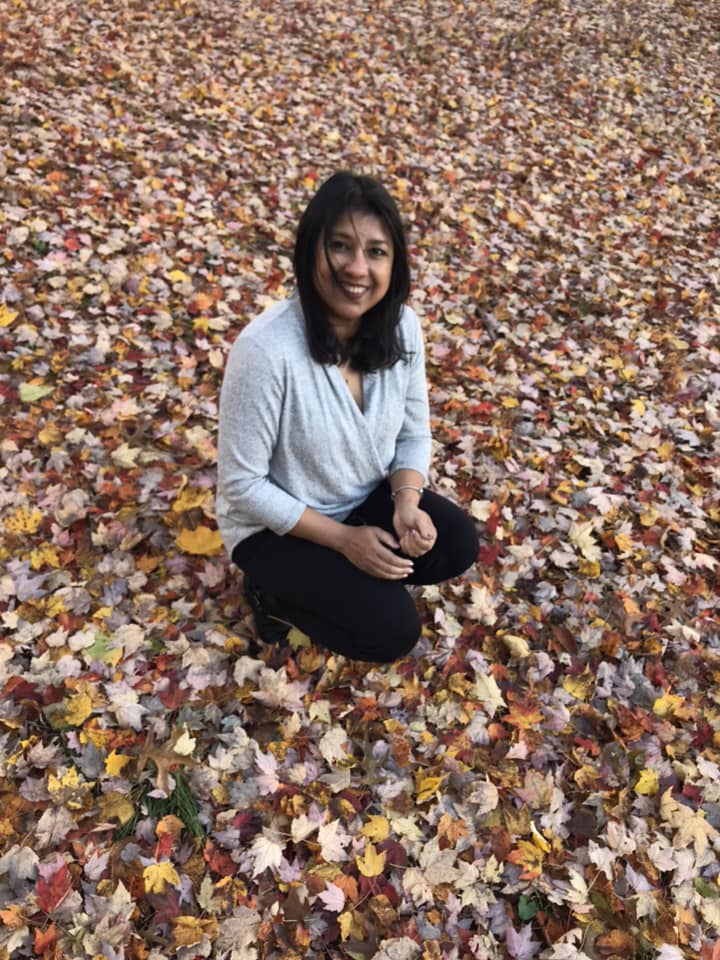
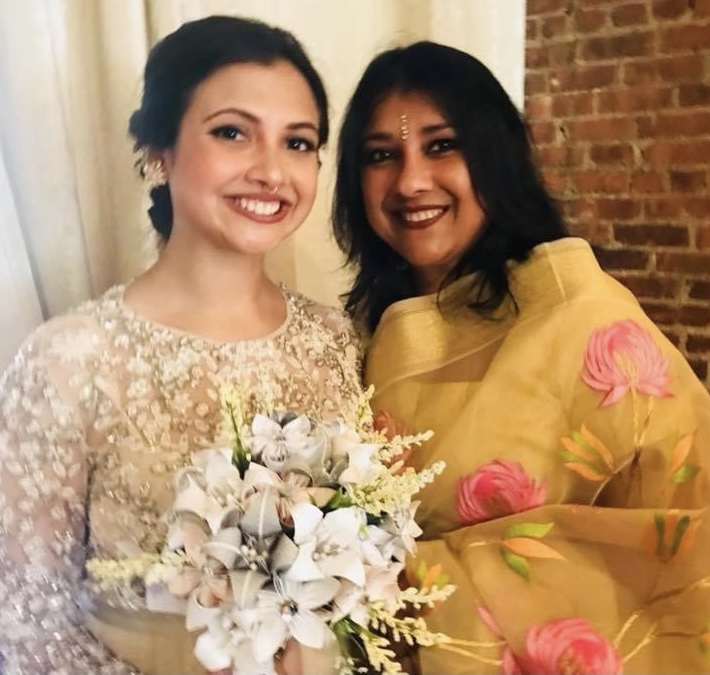
WOW, WOW, WOW.
You should definitely write a book, millions of Americans are going through this. You would really be helping millions cope with what you went through.
You must be a very strong woman to have endured this as a child and write about it.
Allah bless you and your family.
LikeLike